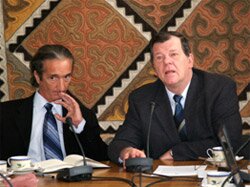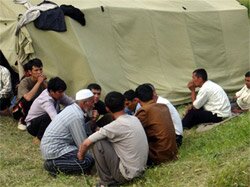
# 248
May 20, 2005
In this issue:
UNITED NATIONS COUNTRY TEAM
- The UN Inter-Agency Mission to Kyrgyzstan: No Humanitarian Crisis but Risks and Vulnerabilities
UNITED NATIONS COUNTRY TEAM
The UN Inter-Agency Mission to Kyrgyzstan: No Humanitarian Crisis but Risks and Vulnerabilities.
“There is no complex or other humanitarian crisis that has occurred in Kyrgyzstan as a result of the events of this past March. The current food security situation in the Kyrgyz Republic is not significantly different from the situation prior to the March events. The March events may have resulted in a ‘crisis of confidence’ but did not affect to a noticeable extent, the food security status of the population,” states the report of the UN Inter-Agency Mission to Kyrgyzstan. “However the Interagency mission is concerned about the on-going structural risks and vulnerabilities, exacerbated by the deep and chronic poverty in many parts of the country, affecting many communities in both rural and urban areas, which under certain conditions could intensify and result in humanitarian crisis.”
 As a consequence of recent events in Kyrgyzstan, the mission, comprising experts of OCHA, UNICEF, UNDP, WFP and WHO, was requested by the UN Resident Coordinator and members of the UN Country Team (UNCT). The team was deployed to Kyrgyzstan since 10th May for ten days to assist the UNCT in assessing emergency needs and increasing its capacity in addressing potential crisis. As a consequence of recent events in Kyrgyzstan, the mission, comprising experts of OCHA, UNICEF, UNDP, WFP and WHO, was requested by the UN Resident Coordinator and members of the UN Country Team (UNCT). The team was deployed to Kyrgyzstan since 10th May for ten days to assist the UNCT in assessing emergency needs and increasing its capacity in addressing potential crisis.
The mission held meetings with the UN Resident Coordinator, Heads of UN Agencies, its staff and a number of government agencies, non-governmental and research institutions. On 15 May, the assessment group went to Jalalabat and Osh for household interviews and discussions with officials relating to food security and health / education issues.
Violent Uzbek Incidents added “extra lens”
In the course of the mission a series of violent events occurred in Uzbekistan, causing an influx of asylum seekers to Kyrgyzstan. The events added an extra ‘lens’ to the mission’s work, not only in terms of the influx itself but on its potential implications for the already meager coping capacities in the Southern provinces of Kyrgyzstan. In this situation the mission could assist, providing “real life” training and guidance to the UNCT which reacted immediately under UNHCR leadership and support from USAID.
“The missions arrival was very timely,” Carlos Zaccagnini, chief of the UNHCR mission in Kyrgyzstan stated. “Instead of 540 asylum seekers there could be many more if such events should happen again. We are now building up UN presence in the South with additional stocks, communication equipment and staff. The tools and mechanisms the mission brought will helped us to increase our capacity.”
 Recent events have also underscored the disconnect between the central government and local authorities. An aggravation of this weakness can strain the state structure with potentially severe consequences, especially for vulnerable population groups. Recent events have also underscored the disconnect between the central government and local authorities. An aggravation of this weakness can strain the state structure with potentially severe consequences, especially for vulnerable population groups.
Political stability, a fair and free election process for the upcoming presidential elections on July 10th, economic security and mechanisms to effectively fight corruption are obvious priorities. Protection issues during this period need to be very closely monitored and an advocacy strategy developed.
“With the presidential election ahead and the establishment of a new Government, Kyrgyzstan is going through a transition period,” said Gregoire de Brancovan, Head of Preparedness and Contingency Planning Cell in OCHA, New York. “The Government will have to manage tensions, coming from political processes, natural disasters and international tensions to avoid spillover effects that can transform into a national crisis.”
Benefits of Economic Growth do not reach the Poorest
Although official government statistics indicate overall economic progress, those aggregative figures do not seem to capture adequately the dramatic poverty at the household level found in some areas. Household visits in the Osh & Jalalabad oblasts confirmed very poor food diversity with consequent high levels of micronutrient deficiencies and under-nutrition.
The mission recommended to the UN in Kyrgyzstan to sponsor a forum bringing together all stakeholders to identify key areas of targeted action and to better complement their activities. Further in-depth assessment efforts are needed to better understand, why the benefits of recent economic growth have not reached the poorest segment of the population. The UN should develop a common advocacy strategy to ensure the protection of vulnerable groups and respect of basic human rights.
Regarding food security and livelihood, the mission’s recommendations include targeted in-depth studies of livelihoods in chronically poor and vulnerable areas as a pre-condition for the implementation of complementary UN activities and effective safety net and social protection programs. Food-for-work programmes could combine a direct food security impact with labour-based improvements of community infrastructure and agriculture land. Food transfers could also assist during the resettlement of families from highly disaster prone areas. School feeding in the poorest areas could contribute to the nutrition of children and encourage regular school attendance.
As for health and basic services, the humanitarian mission underlined that water and sanitation and the provision of safe drinking water needs to become a priority intervention to reduce the high level of infectious diseases. Drug trafficking, associated with a rising HIV/AIDS prevalence in some parts of the country and the associated high level of corruption is a major underlying problem affecting all sectors and needs a consolidated effort from the Government. Therefore during the transition and medium term, priority should be given to the maintenance of basic social services, based on an improved analysis of the most vulnerable. This should help to reduce the risk of social unrest. Also, education curricula should integrate disaster and risk awareness information.
In natural and technological disasters the UNCT should consider supporting the Ministry of Environment and Emergency in establishing or consolidating a forum to map-out and coordinate all the ongoing initiatives in disaster preparedness and prevention. This would facilitate the identification of priority unmet needs, avoid gaps and duplications, while making optimal use of available resources and capacities. In the broader framework of disaster preparedness and response the issue of high risk for both natural disasters and man made disasters need to be addressed as priority areas for intervention with a clear necessity to upgrade the capacity of local authorities to prevent and manage potential crisis and to cope with health related aspects of such events.
“One of the important results of the mission will be the need to engage the Government of Kyrgyz Republic, the civil society, the donor organizations and the UN to refocus the existing development assistance to the country in view of addressing the most urgent issues ensuring the needs of the most vulnerable groups of population, - said Mr. Jerzy Skuratowicz, UN Resident Coordinator at the meeting with acting President of the Kyrgyz Republic Mr. Kurmanbek Bakiev.
“The mission report also points out that we need urgent response of the international community and that additional resources might be required, - he said.
For additional information please contact Olga Grebennikova, UNDP Public Affairs Officer: Tel. 0 996 (312) 61-12-13. Cell phone: 0 996 (502) 51-22-99. E-mail:
|

